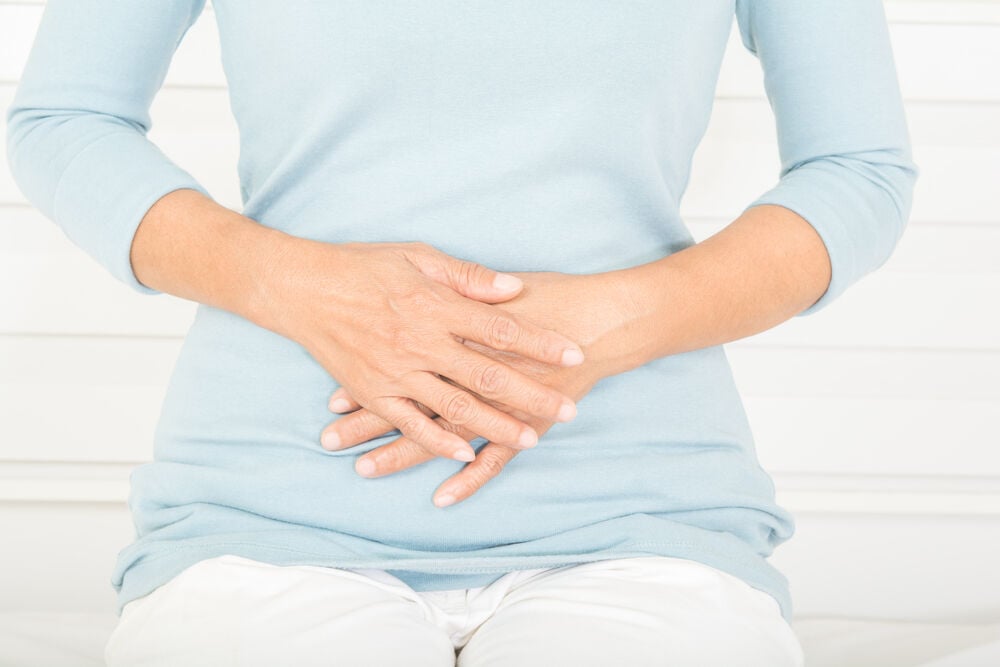Shifts in hormones and gastrointestinal problems should be closely monitored during both perimenopause and menopause. Here, Flo outlines their connection to hot flashes and constipation, along with helpful advice on speeding up digestion and staying regular.
-
Tracking cycle
-
Getting pregnant
-
Pregnancy
-
Help Center
-
Flo for Partners
-
Anonymous Mode
-
Flo app reviews
-
Flo Premium New
-
Secret Chats New
-
Symptom Checker New
-
Your cycle
-
Health 360°
-
Getting pregnant
-
Pregnancy
-
Being a mom
-
LGBTQ+
-
Quizzes
-
Ovulation calculator
-
hCG calculator
-
Pregnancy test calculator
-
Menstrual cycle calculator
-
Period calculator
-
Implantation calculator
-
Pregnancy weeks to months calculator
-
Pregnancy due date calculator
-
IVF and FET due date calculator
-
Due date calculator by ultrasound
-
Medical Affairs
-
Science & Research
-
Pass It On Project New
-
Privacy Portal
-
Press Center
-
Flo Accuracy
-
Careers
-
Contact Us
Menopause and Constipation: Does Progesterone Cause Constipation in Women?


Every piece of content at Flo Health adheres to the highest editorial standards for language, style, and medical accuracy. To learn what we do to deliver the best health and lifestyle insights to you, check out our content review principles.
Menopause and stomach issues
The human digestive system is a key component of overall physical health. During perimenopause and menopause, it’s possible to develop digestive issues, including constipation and slow intestinal movement.
The rate of constipation is higher in women than men, especially at a younger age. Female sex hormones influence the functioning of the GI system because estrogen receptors reside in the mucous membrane of the stomach and small intestines. They can inhibit the ability of these muscles to contract at various sites like the colon. That’s why fluctuations in progesterone and estrogen could be (at least partially) to blame for menopause constipation.
Some studies suggest estrogen is capable of reducing bowel movements in women based on past clinical research. But others point to the tendency of pregnant and menstruating females, who have changing progesterone levels, to become constipated.
Apart from menopause constipation, you might also notice other digestive symptoms during this particular phase of life. They include diarrhea, heartburn, bloating, irritable bowel syndrome (IBS), lactose intolerance, and vomiting. Of course, it’s true that GI complications can be attributed to a number of different things. But the erratic hormonal activity that characterizes menopause (namely decreased estrogen and progesterone) appears to be the likeliest culprit.
An unhealthy diet lacking fiber and loaded with processed foods also promotes digestive irregularities during menopause. Smoking, physical inactivity, alcohol abuse, stress, and taking certain medications (e.g., antibiotics) all play a role as well.
Perimenopause and diarrhea
The relationship between hormones and gastrointestinal problems extends even further. Reduced quantities of estrogen sometimes initiate a domino effect in the body by increasing its production of cortisol, the stress hormone. Higher stress equals higher blood pressure and blood sugar, not to mention heightened acid levels in the stomach which cause bloating. Colon muscles, in turn, become too relaxed and produce diarrhea ‒ a common perimenopause and menopause side effect.
Abdominal bloating
Bloating makes your belly feel tight, full, and distended. It’s usually brought on by water retention or air retention (and potentially, menopause-related complications).
Scientific evidence demonstrates that both progesterone and estrogen can affect the physiological system by altering the regulation of sodium and fluid content. Increased estrogen encourages water retention, whereas a dip in progesterone levels encourages diuresis or frequent urination.
Abdominal bloating may even be the result of shifts in estrogen and disrupted bile production, another trigger for menopause constipation. Stools in the large intestines become dry, hard, and accumulate over time due to insufficient lubrication, leading to pain and discomfort.
Although dietary and lifestyle habits during menopause should be taken into account, bloating often originates with unbalanced hormones and gastrointestinal problems.
Constipation
Does menopause cause constipation? It certainly can, and bowel movement disturbances might even show up while you’re still in perimenopause.
As mentioned, estrogen is crucial to maintaining overall health and once its levels begin to dip, cortisol starts to rise. Added stress slows the process of digestion and prevents the body from breaking down food in a timely manner. Passing stools through the digestive tract therefore becomes increasingly difficult.
An accompanying drop in progesterone aggravates menopause constipation further by interfering with colon function and drying out collected stools. Plus, the longer that food waste remains in the large intestine, the harder and drier it becomes.
Add this to the fact that pelvic floor muscles are prone to weakening after menopause, making bowel movements an even greater struggle.
Lastly, the use of certain medications at this stage in life is known to generate negative side effects, including menopause constipation.
Take a quiz
Find out what you can do with our Health Assistant
Tips for menopause constipation relief

The trick to relieving bothersome menopause constipation is effectively managing its symptoms. Follow these tips for staying regular:
1. Get active
Routine physical activity like taking brisk walks, cycling, swimming, or hitting the gym go a long way towards improving digestive health. Just be sure to consult your physician before starting a new exercise regimen.
2. Adopt a fiber-rich diet
Eating foods high in fiber and drinking plenty of fluids (particularly water) speed up digestion and help alleviate menopause constipation. Try swapping the usual processed convenience meals and snacks with better-for-you alternatives such as:
- Whole grains (e.g., brown rice and bran flakes)
- Fruits (e.g., apples, pears, and raspberries)
- Vegetables (e.g., broccoli, peas, and spinach)
- Legumes (e.g., beans and lentils)
- Seeds and nuts
3. Take laxatives
Сheck with your doctor on whether taking laxatives is the right option for you.
Should over-the-counter (OTC) laxatives fail to do the trick, consult a gastroenterologist who can recommend alternative approaches to battling menopause constipation. In severe cases, it might be necessary to rely on other kinds of medications.
Takeaway
Is it true? Can menopause cause constipation? Yes, possibly. Menopause constipation is a byproduct of rapid changes in hormones and gastrointestinal problems during this transitional phase of a woman’s life.
Though underlying conditions or lifestyle choices could factor into the equation, persistent GI issues and slow-moving intestines are frequently linked to unpredictable estrogen and progesterone levels.
Menopause constipation is the result of these hormones inhibiting the contraction of your colon muscles. (Other menopause-related symptoms include heartburn, bloating, vomiting, lactose intolerance, irritable bowel syndrome, and even diarrhea.)
Ease the pain and discomfort of menopause constipation by incorporating physical activity, a fiber-rich diet, and lots of water into your daily regimen.


Hey, I'm Anique
I started using Flo app to track my period and ovulation because we wanted to have a baby.


The Flo app helped me learn about my body and spot ovulation signs during our conception journey.


I vividly
remember the day
that we switched
Flo into
Pregnancy Mode — it was
such a special
moment.
Real stories, real results
Learn how the Flo app became an amazing cheerleader for us on our conception journey.
References
History of updates
Current version (08 April 2020)
Published (08 April 2020)
In this article

Track your perimenopause journey in the Flo app
-
Log symptoms and get tips to manage them
-
Learn what to expect with expert-led articles and videos
-
Connect with others who can relate to how you're feeling




